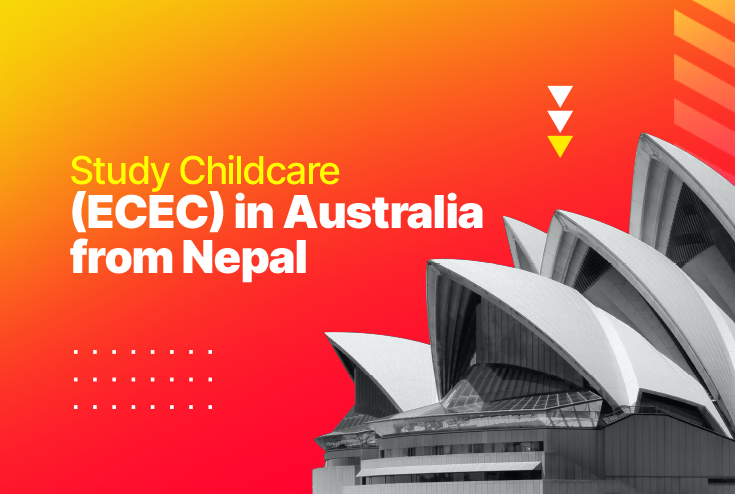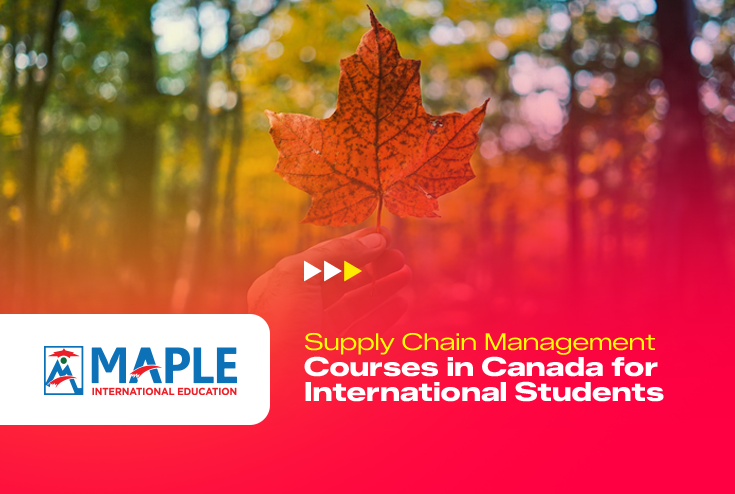
Study Childcare (ECEC) in Australia from Nepal – Courses, Cost, PR 2025
Are you passionate about working with young children and shaping their early years? Studying Childcare (Early Childhood Education and Care - ECEC) in Australia offers an excellent pathway for Nepali students who aspire to build a rewarding and in-demand career. With world-class education, multicultural experiences, and a strong demand for childcare professionals, Australia is one of the best destinations to pursue ECEC qualifications.
This blog will guide you through everything you need to know about studying childcare in Australia from Nepal - courses, eligibility, costs, visa requirements, job opportunities, and permanent residency (PR) prospects in 2025.
Table of Contents
Why Study Childcare in Australia?
High Demand Profession
Globally Recognized Qualifications
Hands-On Practical Training
Strong Job Prospects
Clear Pathway to PR
Different Childcare Course in Australia
Certificate III in Early Childhood Education and Care
Diploma of Early Childhood Education and Care
Bachelor of Early Childhood Education
Eligibility Requirements to Study Childcare (ECEC) in Australia
Certificate III in Early Childhood Education and Care
Diploma of Early Childhood Education and Care
Bachelor of Early Childhood Education
Required Application Documents
Top Australian Institutions Offering Childcare (ECEC) Courses
How to Choose the Right Institution?
How Much Does it Cost to Study Childcare in Australia from Nepal?
Tuition Fees
Other Essential Costs
How to Apply for Childcare (ECEC) in Australia from Nepal?
Research and Shortlist Institutions
Check Eligibility Requirements
Gather Required Documents
Apply to Universities
Receive and Accept Offer Letter
Prepare for Visa Application
Attend Biometric & Medical Examination
Receive Visa Grant & Prepare for Travel
Post-Study Opportunities After Studying Childcare (ECEC) in Australia
Immediate Job Opportunities
Temporary Graduate Visa (Subclass 485)
Pathway to Permanent Residency (PR)
Further Study Options
Conclusion
FAQs - Study Childcare (ECEC) in Australia from Nepal
Why Study Childcare in Australia?
Australia places strong emphasis on early childhood development and education, supported by government funding and national quality frameworks. With increasing demand for qualified childcare professionals, studying ECEC in Australia offers international students, especially from Nepal, a career-focused pathway with high employability and migration potential.
1. High Demand Profession
There is a growing shortage of qualified early childhood educators in Australia due to population growth, expanded government support for early learning, and increased enrolment in childcare centres. This makes it a reliable and future-proof career choice.
2. Globally Recognized Qualifications
Australian childcare qualifications such as Certificate III, Diploma, and Bachelor’s in Early Childhood Education are accredited under the Australian Qualifications Framework (AQF) and widely accepted internationally - allowing graduates to work not just in Australia, but also in other countries like Canada, New Zealand, and the UK.
3. Hands-On Practical Training
ECEC programs combine theory with mandatory work placements in approved childcare settings. This ensures that students gain real-world, job-ready experience, improve communication and leadership skills, and meet industry standards from day one.
4. Strong Job Prospects
Graduates can find employment quickly in roles such as assistant educator, lead educator, childcare centre worker, or family daycare provider. Entry-level salaries typically start at AUD 45,000–55,000 per year, with potential to earn more as experience grows.
5. Clear Pathway to PR
ECEC-related occupations like Early Childhood (Pre-primary School) Teacher (ANZSCO 241111) and Child Care Centre Manager (ANZSCO 134111) are listed on Australia’s Skilled Occupation Lists (SOL, MLTSSL), making them eligible for skilled migration and permanent residency after gaining relevant work experience.
Different Childcare Course in Australia
Australia offers a structured pathway of ECEC programs tailored to different career levels, from entry-level to professional teaching roles. Below are the top courses to consider:
1. Certificate III in Early Childhood Education and Care
Level: Entry level
Duration: 12 - 18 months
Ideal For: Students starting a career in childcare
Outcome: Assistant Educator, Family Day Care Worker
Key Learning: Child safety, support for play-based learning, first aid, child development
Pathway: Leads to Diploma of ECEC
2. Diploma of Early Childhood Education and Care
Level: Intermediate/Advanced
Duration: 18 - 24 months
Ideal For: Students who want leadership roles in childcare settings
Outcome: Lead Educator, Room Leader, Childcare Centre Supervisor
Key Learning: Designing curriculum, managing staff and compliance, advanced child development
Pathway: Leads to Bachelor’s in Early Childhood Education
3. Bachelor of Early Childhood Education
Level: University level degree
Duration: 3 years
Ideal For: Students aiming to become registered Early Childhood Teachers
Outcome: Kindergarten Teacher, Preschool Teacher, Education Program Leader
Key Learning: Teaching pedagogy, educational psychology, inclusive education, leadership
Accreditation: Recognized by ACECQA (Australian Children’s Education & Care Quality Authority)
PR Advantage: Eligible for teacher registration and skilled migration
Eligibility Requirements to Study Childcare (ECEC) in Australia
1. Certificate III in Early Childhood Education and Care
Academic Requirements:
Completion of +2 / Higher Secondary Education / Proficiency Certificate Level Examinations (any stream)
Minimum GPA: 2.4 or above (50% - 60%)
English Language Requirements:
IELTS: Overall 6.0 (no band less than 5.5)
PTE: Overall 50 (no band below 44)
TOEFL iBT: Minimum 60
They are typically offered along with the Diploma courses by the institutions for the international students from Nepal.
2. Diploma of Early Childhood Education and Care
Academic Requirements:
Completion of +2 / Higher Secondary Education / Proficiency Certificate Level Examinations (any stream)
Minimum GPA: 2.4 or above (50% - 60%)
English Language Requirements:
IELTS: Overall 6.0 (no band less than 5.5)
PTE: Overall 50 (no band below 44)
TOEFL iBT: Minimum 60
3. Bachelor of Early Childhood Education
Academic Requirements:
Completion of +2 with strong results (preferably in Education, Science, or Humanities)
Minimum GPA: 2.8 – 3.0 (65% or higher)
English Language Requirements:
IELTS: Overall 6.0 (no band less than 6.0)
PTE: Overall 50 (no section below 50)
TOEFL iBT: Minimum 60
Required Application Documents
Academic Transcripts and Certificates
English Proficiency Test Scores
Valid Passport Copy
CV / Resume
Statement of Purpose
Proof of Funds
Application Forms (Institution-specific)
Top Australian Institutions Offering Childcare (ECEC) Courses
These institutions are highly regarded for their quality teaching, industry placements, and support for international students pursuing ECEC qualifications.
How to Choose the Right Institution?
When choosing your ECEC institution, consider:
CRICOS registration
Regional location (for PR points)
Tuition affordability
Placement opportunities
Visa success track record
How Much Does it Cost to Study Childcare in Australia from Nepal?
On average, tuition fees for the childcare program range from AUD 7,000 to AUD 30,000 per year, depending on the level of the course - Certificate III, Diploma, or Bachelor’s degree. In addition, international students are required to show evidence of at least AUD 29,710 per year to cover living expenses. This makes the total estimated annual cost between AUD 36,710 to AUD 59,710.
1. Tuition Fees
2. Other Essential Costs
OSHC (Insurance): AUD 500 - 700 per year
Living Cost: AUD 29,710/year (mandatory for visa)
Visa Application Fee: AUD 2,000
For a comprehensive breakdown of all the key expenses - from tuition and visa fees to living costs, please refer to this blog:
Cost to Study in Australia from Nepal in 2025: A Guide
How to Apply for Childcare (ECEC) in Australia from Nepal?
Applying for a Early Childhood Education and Care (ECEC) in Australia from Nepal involves multiple steps - from choosing the right university to getting your visa approved. Here’s a complete roadmap to help you navigate the process confidently.
Step 1: Research and Shortlist Institutions
Begin by researching institutions based on Tuition fees, Location (regional or metro), Scholarship availability, and Visa success rate for Nepali students.
Step 2: Check Eligibility Requirements
Ensure you meet the basic GPA, english test scores, and financial criteria of the selected universities / colleges.
Step 3: Gather Required Documents
Compile your necessary documents i.e. passport, academic transcripts and certificates, language proficiency test scores, SOP, financial documents, CV/resume, recommendation letters, work experience letters (if applicable).
Step 4: Apply to Universities
You can apply directly through the university website, through a recognized education consultancy.
Step 5: Receive and Accept Offer Letter
If accepted, you’ll receive:
Conditional Offer Letter (based on pending documents or payments)
Unconditional Offer Letter once all conditions are met
To accept the offer:
Sign the acceptance form
Pay initial tuition deposit (as per the university conditions)
Purchase Overseas Student Health Cover (OSHC) for the full study period
Step 6: Prepare for Visa Application
Apply for the Australian Student Visa (Subclass 500) through the ImmiAccount portal. Key visa requirements:
COE (Confirmation of Enrollment)
OSHC Certificate
GTE Statement (Genuine Temporary Entrant)
Proof of financial capacity (either bank balance or education loan)
Academic documents and SOP
Source of income of your sponsors (Primary sponsors - Parents and Siblings recommended) along with tax clearance documents and bank statement
Proof of relationship with your sponsors
Step 7: Attend Biometric & Medical Examination
You are required to:
Provide biometric information at VFS Global
Attend a medical examination through verified centres (Norvic Hospital, IOM, TMMC, etc.)
Step 8: Receive Visa Grant & Prepare for Travel
Once your visa is approved:
Book your flight tickets
Arrange accommodation (university hostel or shared housing)
Post-Study Opportunities After Studying Childcare (ECEC) in Australia
Studying Early Childhood Education and Care (ECEC) in Australia not only prepares you for a meaningful career but also opens several work and migration opportunities after graduation. Here’s what Nepali students can look forward to after completing Certificate III, Diploma, or Bachelor’s degrees in childcare:
1. Immediate Job Opportunities
After graduation, you can work in:
Childcare Centres
Kindergartens and Preschools
Family Day Care Services
Community Childcare and Welfare Services
Job Roles Include:
Childcare Assistant
Early Childhood Educator
Lead Educator / Room Leader
Childcare Centre Supervisor
Kindergarten Teacher (Bachelor's level)
Average Starting Salary:
AUD 45,000 – 55,000/year for Diploma graduates
AUD 60,000 – 75,000/year for Bachelor degree holders
2. Temporary Graduate Visa (Subclass 485)
Allows eligible international graduates to stay and work full-time in Australia for 18 months to 4 years (depending on qualification and location)
Diploma Holders: May apply under Graduate Work Stream if the occupation is on the skilled list
Bachelor Graduates: Eligible for Post-Study Work Stream (2–4 years validity)
3. Pathway to Permanent Residency (PR)
Several childcare-related occupations are listed on the Medium and Long-Term Strategic Skills List (MLTSSL), offering a clear route to PR:
Early Childhood (Pre-primary School) Teacher – ANZSCO 241111
Child Care Centre Manager – ANZSCO 134111
PR Pathways include:
Skilled Independent Visa (Subclass 189)
Skilled Nominated Visa (Subclass 190)
Regional Sponsored Visa (Subclass 491)
Employer-Sponsored Visas (Subclass 186 or 482)
4. Further Study Options
You may also choose to continue your education to improve your credentials and PR chances:
Bachelor of Early Childhood Education (after Diploma)
Graduate Diploma or Master’s in Education or Teaching (after bachelor)
Conclusion
Studying Early Childhood Education and Care (ECEC) in Australia from Nepal is more than just earning a qualification, it’s an investment in a meaningful, respected, and in-demand profession. With globally recognized courses, hands-on training, and strong job opportunities, Australia offers an ideal pathway for students who are passionate about shaping young lives.
From Certificate III to Bachelor’s degrees, each level opens doors to real career prospects and potential permanent residency through Australia’s skilled migration routes. Whether you aim to work in a childcare centre, become a kindergarten teacher, or manage your own daycare, Australia's childcare sector equips you with the skills, recognition, and migration options to build a secure and fulfilling future.
If you're a Nepali student dreaming of working with children, making a difference, and starting a life in Australia - ECEC is the perfect pathway to get there.
Contact us now to get started!
FAQs - Study Childcare (ECEC) in Australia from Nepal
1. How much does it cost to study child care in Australia?
The cost to study childcare in Australia ranges from AUD 7,000 to AUD 10,000 per year for Certificate III, AUD 12,000 to AUD 16,000 for Diploma, and AUD 22,000 to AUD 30,000 for a Bachelor’s degree. Costs vary by institution and location.
2. How much does it cost to study in Australia from Nepal?
Nepali students typically spend around AUD 35,000 to AUD 55,000 per year, which includes tuition fees, living expenses (AUD 29,710 minimum for visa), health insurance, and other essentials.
3. What qualifications do I need to be a childcare worker in Australia?
To work in the childcare sector, you must complete at least a Certificate III in Early Childhood Education and Care. For higher roles like room leader or supervisor, a Diploma is needed. To become a kindergarten teacher, a Bachelor’s in Early Childhood Education is required.
4. Is there PR in child care courses in Australia?
Yes. Childcare-related occupations like Early Childhood Teacher (ANZSCO 241111) and Child Care Centre Manager (ANZSCO 134111) are listed on Australia’s Skilled Occupation Lists, making graduates eligible for Temporary Graduate Visas and PR pathways such as 189, 190, and 491 visas.
5. Is childcare in demand in Australia?
Absolutely. There is a national shortage of qualified childcare educators due to increased demand for early learning and workforce gaps. This creates strong job opportunities and long-term career stability for ECEC graduates.
6. In which course is PR easy in Australia?
Courses leading to occupations on the Medium and Long-Term Strategic Skills List (MLTSSL) have easier PR pathways. Popular PR-friendly fields include Nursing, Early Childhood Education, IT, Engineering, and Trade occupations in demand.
Also Read:
Study in Australia from Nepal: A 2025 Guide
Cost to Study in Australia from Nepal in 2025: A Guide
Best Consultancy in Nepal for Australia in 2025




